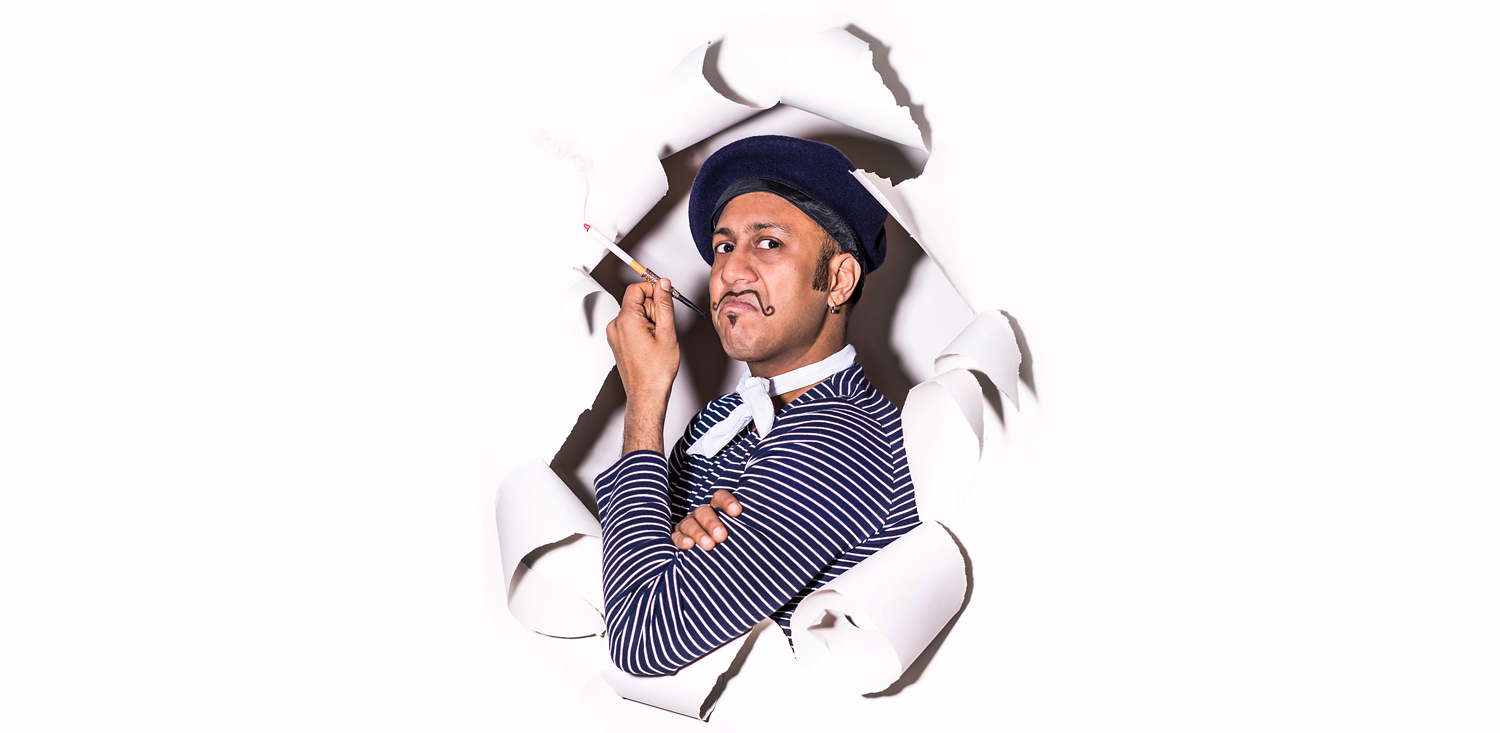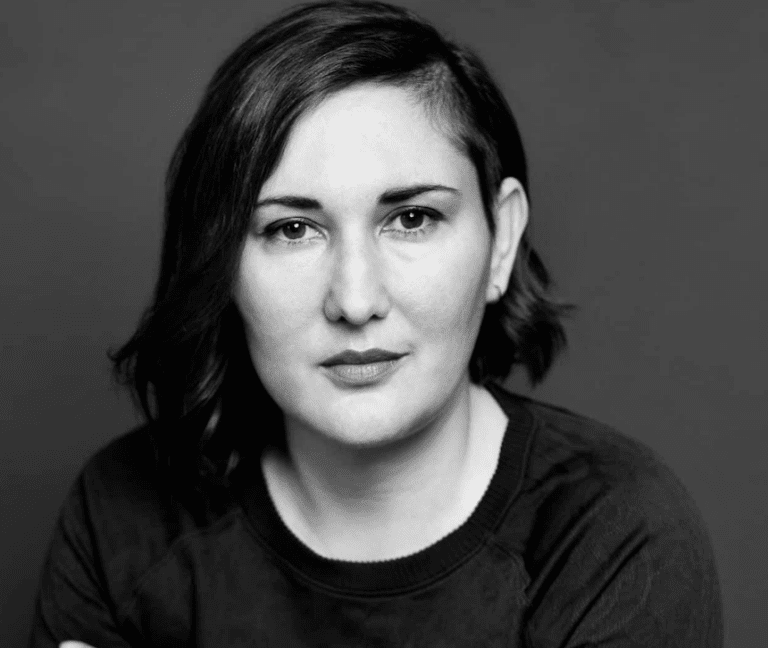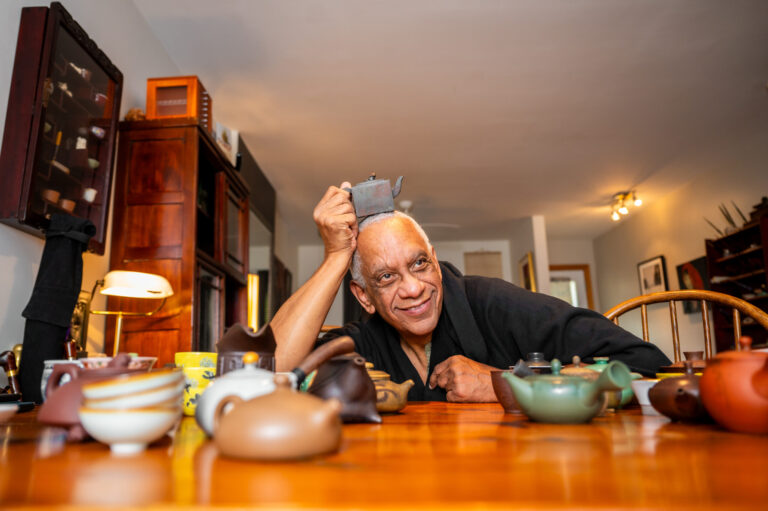Spotlight: Ravi Jain
“I’m really lucky,” Ravi Jain says often in the hour we spend together at the Theatre Centre on Queen Street West, cooped up in the green room. But spending just sixty minutes with the respected theatre actor, director, and producer, it’s clear his success is about so much more than luck.
Jain has trained extensively. After attending high school in Toronto, he took off to London with the hope of becoming a famous actor. He had enrolled in a theatre school he’d heard was the best of the best. Jain knew he had talent but couldn’t say the same of his classmates, so he left, chasing the idea of being surrounded by “the best.” That brought him to NYU’s Tisch School of the Arts. He was searching for training that spoke to him as a performer and dealt with contemporary theatre of the moment. Although the program didn’t measure up in his eyes, he found New York to be an incredible teacher. There he learned to hustle, and because of his drive, he had the chance to work with some of the masters, like Mary Overlie, Bill Irwin, and Stephen Wangh.
Eventually, Jain made his way to a regional theatre company in Washington, putting him on the track to acting success. For the most part, he performed Shakespeare to half-asleep sixty- to seventy-year-olds, and he was miserable. But matinees drew a different crowd: inner-city black youth. The company was staging A Midsummer Night’s Dream and Jain’s castmate took the stage for a monologue. As she was projecting her despair—how her love preferred another woman though she was just as pretty—a girl in the audience interrupted with sass, “Mmmhmm, I know that.” The people around her laughed. To the actor, the disruption was unacceptable. To Jain, it was what theatre was all about.
That moment took him to Lecoq, an avant-garde theatre school in Paris, a place designed for creators. There, he found his raison d’être: to effect change in theatre, which at the time looked to him like an old-people’s art form, by engaging in conversation with the audience. He returned home to Toronto a decade ago, and has been living and working here ever since, conversing with countless spectators.

Rather than limit himself to a single function—director, artistic director, producer, actor—Jain calls himself a theatre-maker. He embodies that multi-faceted role more than any other artist in Toronto, and with more zest, too. The first time actor Christine Horne, who has worked with Jain on six productions of Iceland, met him, she thought, “Who is this ball of fire?” She mentions his irrepressible joy, and recalls how when he won the Pauline McGibbon Award at the 2012 Dora Awards, he made everyone in the audience yell JOY! with him.
On top of directing and acting, Jain is the artistic director of Why Not Theatre, where he creates politically relevant work, constantly playing with the form of storytelling. Why Not experiments with novel producing models, like last year’s wildly successful November Ticket, which presented three shows for the price of one. They also put on foreign-language theatre from around the world, tour shows globally, and bring in international theatre creators to speak with Toronto artists. Developing and strengthening ties with communities around the city and abroad is of the utmost importance to him. It’s no wonder his shows are often filled with first-time audience members.
Jain may be the busiest theatre-maker in the city. “There’s always a Ravi Jain show you can see,” says Horne. But it’s never the Ravi Jain show. Over the years, he has built relationships with the best in the business, like Horne and playwright Nicolas Billon. Trust plays a big role in how he’s able to bring ideas to life so successfully. On each project, Jain likes to work with at least one or two people he has developed a shorthand with, and who he can ask, “Is this shit?” and get an honest answer.
Nonetheless, Jain makes a point of not shutting anyone out of his circle. He welcomes the opportunity to work with “wildcards,” people he has no history with. He calls this throwing the roulette. “It’s important to ensure that in a process, I’m a little bit off guard. I want to work in a way that forces me to flex muscles I don’t normally get to use.”
Jain’s openness and eagerness to collaborate with new talent extends beyond first-time collaborators to include emerging artists. He treats them all more or less the same, no matter their level of experience. “We have a real culture in Toronto of dramaturgy, of artistic directors who feel like they need to impose on a youngster and tell them, ‘Here’s what you should or should not do.’ For me, I can give advice, but I’m interested in being told I’m wrong, or being shown something totally new. And taking the risk to have someone fail.”

This comes, in part, from his time in university, where he and his friends would just “throw shit to the wall and try things, recklessly.” Not all of it made sense; in fact, much of it didn’t. But “you need chaos, disorder, and freedom to then find structure,” he says. If you work the other way around, “you’re missing that key component of energy and abandon and wildness.”
Jain is adamant that giving that space to emerging artists will be beneficial to everyone in the long run. How can creators possibly know who the next great artist will be, or what creative minds are out there, if they don’t make space for it to be discovered?
Being a risk-taker and not fearing fear are qualities vastly missing from leaders in the Toronto theatre scene, according to Jain. “We’re Toronto the Good,” he says. “A lot of people who used to be on the crazy fringes have been chopped off.” He brings up Hillar Liitoja who, in the early 1980s, became the most radical theatre creator in English Canada. He did an eight-hour Hamlet, took audiences on a sensory journey inspired by Ezra Pound’s poetry, and even, at one point, had all his actors perform naked. “There are great stories of how insane he was.” But that kind of theatre in Canada is mostly in the past. “We don’t have the extremes as much. So we don’t have a range, or a threshold for work we don’t understand. We have seasons, branded marketing campaigns.”
What’s missing is disruption. This is something Jain swears by. “I’m not super interested in the status quo, that’s not the experience for me. The experience of this thing called theatre… It’s disruptive.”
When he was training at Lecoq, he was told, “You’re great, you have a great energy, but we’ve seen a lot of the boy. We no longer want to see the boy, we want to see the man.” This set Jain on an inward journey. For a year he turned himself inside out, and he came to realize how “Canadian” he was about things. “How polite, how terrified to disrupt anything around me. That culture is horrific and horrendous. Art is…” he pauses, looking for the right words, “… the most vulnerable thing you can do, because you’re saying, ‘here’s what I am, here’s what I think,’ and everyone has a fucking opinion about it.” The challenge for artists becomes finding a way to stay open and vulnerable so they can put a strong proposal forward without being influenced by wanting to be liked or have their idea liked, or by wanting everyone else to feel good. “No, we don’t need that,” he says emphatically.

Jain admits that these days, maybe because of his age or because he’s spent so much time in Toronto the Good, he’s more conservative than he was as a younger artist. “I see shows in New York that my contemporaries are doing, and I go, ‘What the hell is that? Shit!’” The freedom to create without restraint and the openness to storytelling that came to him so easily a decade ago aren’t as present, and that scares him a bit.
He says he’s consciously looking to break out of that and be open to something he doesn’t understand. “I see people die because their fear is greater than their desire to share. I mean, fuck. If you don’t embrace fear and risk getting it wrong, you’ll never find something new, something inventive, something beautiful.”
Billon was one of the first writers in the city to ask Jain to direct. The play, for SummerWorks, hadn’t been written yet. Billon’s top choice for director didn’t want to commit without a script, and when Billon approached Jain with Greenland’s skeleton, Jain’s response was, “That sounds great, let’s do it.”
“That’s him in a nutshell,” Billon says. “He’ll try anything.”
One of the wonderful things about Jain is that there is no “one thing” he does, no ploy or shtick or trope. He doesn’t arrive in the rehearsal space with a set idea. “He’s open to the play just becoming something, and he’s skilled enough and smart enough to do anything,” says Horne. “There are infinite possibilities that come out of him. I watch his stuff and think, ‘I will follow you anywhere.’” Then she adds, “Even if it’s ultimately a total fucking disaster.”
But it’s usually not a total fucking disaster. His recent direction of Salt-Water Moon for Factory Theatre was “dreamlike,” and was praised by critics and audiences alike. His direction of Iceland, on now at the Theatre Centre, has been called “tight and focused.” And he was just tapped to be an associate artistic director at Soulpepper for the next three years. Luckily for us, we have a lot more of Ravi Jain to look forward to.











Comments